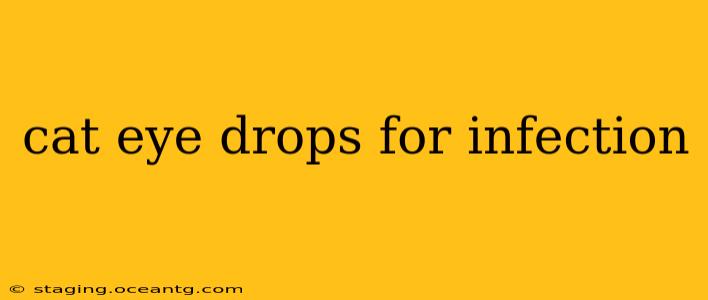Feline eye infections are a common concern for cat owners, causing discomfort and potentially leading to serious complications if left untreated. While cat eye drops can be effective in treating various infections, it's crucial to understand the different types of infections, appropriate treatments, and when professional veterinary care is necessary. This guide will provide a comprehensive overview, addressing common questions and concerns.
What are the Different Types of Cat Eye Infections?
Several types of infections can affect a cat's eyes, each requiring a potentially different treatment approach. These include:
-
Conjunctivitis (Pink Eye): This is a common inflammation of the conjunctiva, the membrane lining the eyelid and covering the white part of the eye. It can be caused by bacteria, viruses, allergies, or irritants. Symptoms include redness, swelling, discharge (which may be clear, yellow, or green), and squinting.
-
Keratitis: This involves inflammation of the cornea, the clear front part of the eye. It can be caused by similar factors as conjunctivitis and can lead to more serious complications if untreated, potentially resulting in vision impairment. Symptoms may include redness, pain, cloudiness of the cornea, and excessive tearing.
-
Ulcers: These are sores on the cornea and are a more serious condition that often requires immediate veterinary attention. They can be caused by trauma, infections, or underlying diseases.
-
Fungal Infections: These are less common but can be severe, often requiring specialized antifungal medications.
It's vital to note that this is not an exhaustive list, and accurate diagnosis is crucial for effective treatment. Never attempt to self-diagnose or treat your cat's eye infection. Always consult a veterinarian for proper diagnosis and treatment.
Can I Use Human Eye Drops on My Cat?
No, you should never use human eye drops on your cat. Human eye drops are formulated for human physiology and may contain ingredients harmful to cats. Using inappropriate eye drops can worsen the infection or cause further irritation. Always consult your veterinarian for appropriate medication for your cat.
What Kind of Eye Drops Does a Vet Prescribe for Cat Eye Infections?
The type of eye drops prescribed will depend on the specific diagnosis. Your veterinarian may prescribe:
- Antibiotic eye drops: These are used to treat bacterial infections.
- Antiviral eye drops: These are used to treat viral infections.
- Steroid eye drops: These may be used to reduce inflammation, but they are typically not used alone and often in conjunction with other treatments. Their use requires careful monitoring by a veterinarian due to potential side effects.
- Artificial tears: These can help to lubricate the eye and provide relief from dryness or irritation.
How Do I Administer Eye Drops to My Cat?
Administering eye drops to a cat can be challenging. Your veterinarian will provide guidance, but generally, you'll need to gently restrain your cat while carefully applying the drops into the lower eyelid. It's often helpful to have another person assist. Be prepared for some resistance!
What if My Cat's Eye Infection Doesn't Improve?
If your cat's eye infection doesn't improve despite treatment, or if symptoms worsen, contact your veterinarian immediately. The infection may be more serious than initially thought, or a different treatment approach may be needed. Delaying treatment can lead to permanent eye damage.
How Can I Prevent Cat Eye Infections?
While not all eye infections are preventable, you can reduce the risk by:
- Maintaining good hygiene: Regularly clean your cat's eyes with a clean, damp cloth.
- Providing a clean environment: Keep your cat's living space clean and free from irritants.
- Regular veterinary checkups: Routine veterinary visits allow for early detection and treatment of any potential problems.
This information is for general knowledge and does not constitute veterinary advice. Always consult a qualified veterinarian for any concerns regarding your cat's health. Early diagnosis and treatment are crucial for successful outcomes when dealing with feline eye infections.
